
Sir Alfred Joseph Hitchcock was an English film director. He is widely regarded as one of the most influential figures in the history of cinema. In a career spanning six decades, he directed over 50 feature films, many of which are still widely watched and studied today. Known as the "Master of Suspense", he became as well known as any of his actors thanks to his many interviews, his cameo roles in most of his films, and his hosting and producing the television anthology Alfred Hitchcock Presents (1955–65). His films garnered 46 Academy Award nominations, including six wins, although he never won the award for Best Director, despite five nominations.

Foreign Correspondent is a 1940 American black-and-white spy thriller film directed by Alfred Hitchcock. It tells the story of an American reporter based in Britain who tries to expose enemy spies involved in a fictional continent-wide conspiracy in the prelude to World War II. It stars Joel McCrea and features 19-year-old Laraine Day, Herbert Marshall, George Sanders, Albert Bassermann, and Robert Benchley, along with Edmund Gwenn.
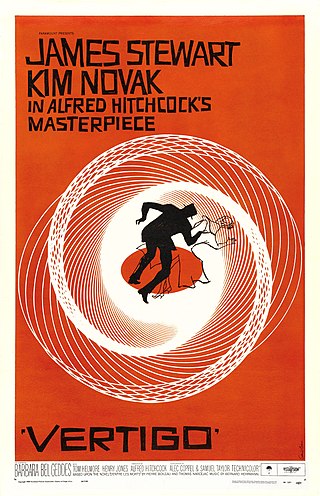
Vertigo is a 1958 American psychological thriller film directed and produced by Alfred Hitchcock. The story was based on the 1954 novel D'entre les morts by Boileau-Narcejac. The screenplay was written by Alec Coppel and Samuel A. Taylor. The film stars James Stewart as former police detective John "Scottie" Ferguson, who has retired because an incident in the line of duty has caused him to develop acrophobia and vertigo, a false sense of rotational movement. Scottie is hired by an acquaintance, Gavin Elster, as a private investigator to follow Gavin's wife, Madeleine, who is behaving strangely.
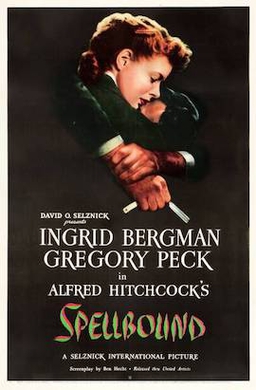
Spellbound is a 1945 American psychological thriller directed by Alfred Hitchcock, and starring Ingrid Bergman, Gregory Peck, and Michael Chekhov. It follows a psychoanalyst who falls in love with the new head of the Vermont hospital in which she works, only to find that he is an imposter suffering dissociative amnesia, and potentially, a murderer. The film is based on the 1927 novel The House of Dr. Edwardes by Hilary Saint George Saunders and John Palmer.
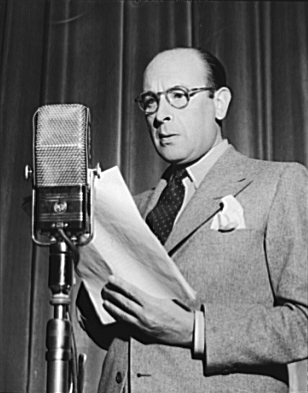
Sir Cedric Webster Hardwicke was an English stage and film actor whose career spanned nearly 50 years. His theatre work included notable performances in productions of the plays of Shakespeare and Shaw, and his film work included leading roles in several adapted literary classics.

Nathalie Kay "Tippi" Hedren is an American retired actress.

Richard Jaeckel was an American actor of film and television. Jaeckel became a well-known character actor in his career, which spanned six decades. He received an Academy Award nomination for Best Supporting Actor with his role in the 1971 adaptation of Ken Kesey's Sometimes a Great Notion.
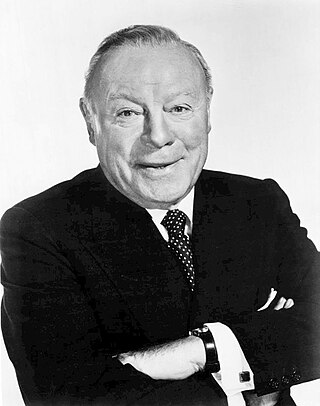
Edmund Gwenn was an English actor. On film, he is best remembered for his role as Kris Kringle in the Christmas film Miracle on 34th Street (1947), for which he won the Academy Award for Best Supporting Actor and the corresponding Golden Globe Award. He received a second Golden Globe and another Academy Award nomination for the comedy film Mister 880 (1950). He is also remembered for his appearances in four films directed by Alfred Hitchcock.
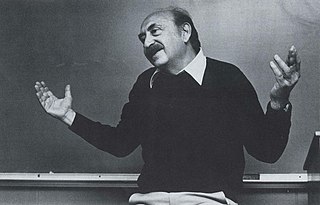
Saul Bass was an American graphic designer and Oscar-winning filmmaker, best known for his design of motion-picture title sequences, film posters, and corporate logos.

Rebecca is a 1940 American romantic psychological thriller film directed by Alfred Hitchcock. It was Hitchcock's first American project, and his first film under contract with producer David O. Selznick. The screenplay by Robert E. Sherwood and Joan Harrison, and adaptation by Philip MacDonald and Michael Hogan, were based on the 1938 novel of the same name by Daphne du Maurier.

Robert Hudson Walker was an American actor who starred as the villain in Alfred Hitchcock's thriller Strangers on a Train (1951), which was released shortly before his early demise.
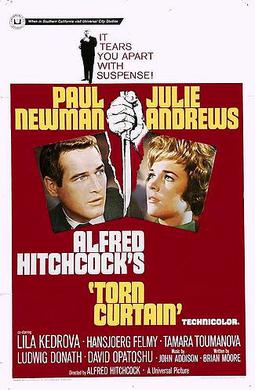
Torn Curtain is a 1966 American spy political thriller film directed by Alfred Hitchcock, and starring Paul Newman and Julie Andrews. Written by Brian Moore, the film is set in the Cold War. It is about an American scientist who appears to defect behind the Iron Curtain to East Germany. It is the first film not to be composed by Bernard Herrmann since ending his long-time collaboration with Hitchcock.
Aventure Malgache (1944) is a short British propaganda film in French directed by Alfred Hitchcock for the British Ministry of Information. The title means Malagasy Adventure in English.

Alfred Hitchcock (1899–1980) was an English director and filmmaker. Popularly known as the "Master of Suspense" for his use of innovative film techniques in thrillers, Hitchcock started his career in the British film industry as a title designer and art director for a number of silent films during the early 1920s. His directorial debut was the 1925 release The Pleasure Garden. Hitchcock followed this with The Lodger: A Story of the London Fog, his first commercial and critical success. It featured many of the thematic elements his films would be known for, such as an innocent man on the run. It also featured the first of his famous cameo appearances. Two years later he directed Blackmail (1929) which was his first sound film. In 1935, Hitchcock directed The 39 Steps; three years later, he directed The Lady Vanishes, starring Margaret Lockwood and Michael Redgrave.

The Fighting Lady is a 1944 documentary film directed by Edward Steichen, produced by the U.S. Navy and narrated by Lt. Robert Taylor USNR. It is not to be confused with the 1954 war drama Men of the Fighting Lady, starring Van Johnson.
George Mandel was an American author and artist. His first novel is considered to be an early work of the east coast Beat Generation. His novels, interviews, novellas, cartoons and short stories have been carried by major publishing houses, print magazines and collections. He was also active as a comic artist.
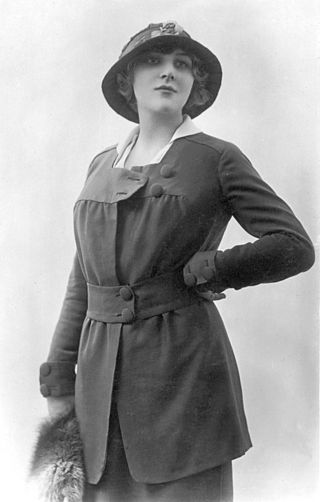
Isobel Elsom was an English film, theatre, and television actress. She was often cast as aristocrats or upper-class women.

Franklyn Farnum was an American character actor and Hollywood extra who appeared in at least 1,100 films. He was also cast in more films that won the Academy Award for Best Picture than any other performer in American film industry. He was also credited as Frank Farnum.
An Elastic Affair (1930) is a 10-minute short comedy film directed by Alfred Hitchcock which features the two winners—Cyril Butcher (1909–1987) as "the Boy" and Aileen Despard (1908–1981) as "the Girl"—of a film acting scholarship sponsored by British film magazine Film Weekly.

The White Shadow, also known as White Shadows in the United States, is a 1923 British drama film directed by Graham Cutts and starring Betty Compson, Clive Brook, and Henry Victor.
















